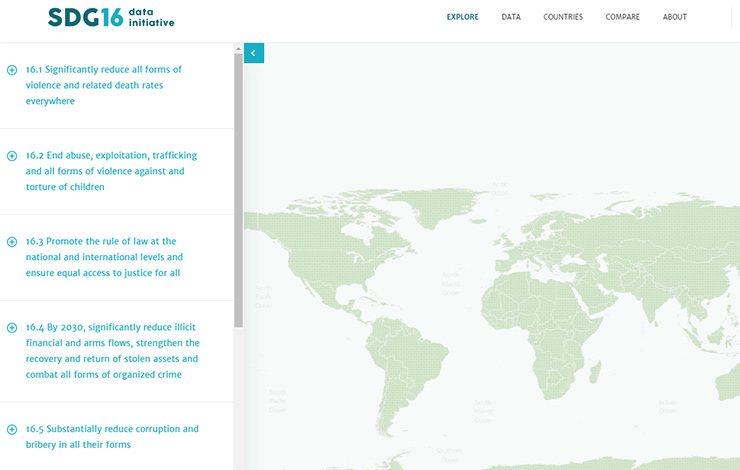
 On July 14, 2016, the World Justice Project was proud to attend the launch of the SDG16 Data Initiative, taking place in conjunction with the United Nation’s High-Level Political Forum on Sustainable Development.
On July 14, 2016, the World Justice Project was proud to attend the launch of the SDG16 Data Initiative, taking place in conjunction with the United Nation’s High-Level Political Forum on Sustainable Development.
The SDG16 Data Initiative is a collective project to compile existing global data that can help track progress towards the achievement of SDG16, which commits all countries to “promote peaceful and inclusive societies for sustainable development, provide access to justice for all, and build effective, accountable and inclusive institutions at all levels.”
The Initiative’s SDG16 platform allows users to compare the recommended UN official indicators for each of the SDG16 targets against complementary indicators from nongovernmental data sources. These proposed indicators are designed to complement official government data, providing the most complete and accurate picture possible of progress towards SDG16.
WJP is one of 14 organizations providing data for this initiative. WJP Rule of Law Index scores for civil justice and criminal justice are used as complementary indicators for target 16.3 on rule of law and equal access to justice. In addition to the official IAEG global indicators – measuring the proportion of victims of violence that report their victimization to the police as well as unsentenced detainees as a proportion of the overall prison population – WJP’s Index scores provide a holistic picture of the accessibility, affordability, impartiality, and effectiveness of civil justice systems, and of the capacity of criminal justice systems to investigate and adjudicate criminal offenses through an impartial system that protects the rights of victims and the accused.
The launch event included an introduction to the initiative, and a demo of the platform by Results for Development Institute Managing Director, Nathaniel Heller. Lisa Bersales, Head of Philippines Statistics Authority and co-chair of the IAEG-SDGs, also gave opening remarks on the usefulness of this initiative for countries like the Philippines that are taking inventory of existing data on SDG16 targets and working to address national and subnational data challenges. Paul Gulleik Larsen, SDG Project Leader for the Norwegian Ministry of Foreign Affairs, commended the initiative for broadening the conversation about the 2030 Sustainable Development Goals to nongovernmental actors, and for “bringing in elements that are fundamental for sustainable development: security, rule of law, and respect for fundamental rights."
The floor was opened for discussion and feedback, which touched on the importance of data that can be disaggregated sub-nationally and by demographics, and on the usefulness of data derived from citizen surveys for monitoring the effectiveness of government policies and services. The need for demand-driven data was also highlighted as a key challenge and opportunity. To this point, Heller noted that while initiatives such as the SDG16 Data Initiative bring us closer to bridging the gap between nationally-led data collection from statistics agencies and a flood of bottom-up data, the key indeed lies in better understanding end users in order to produce data that is both powerful and helpful for policymaking.






